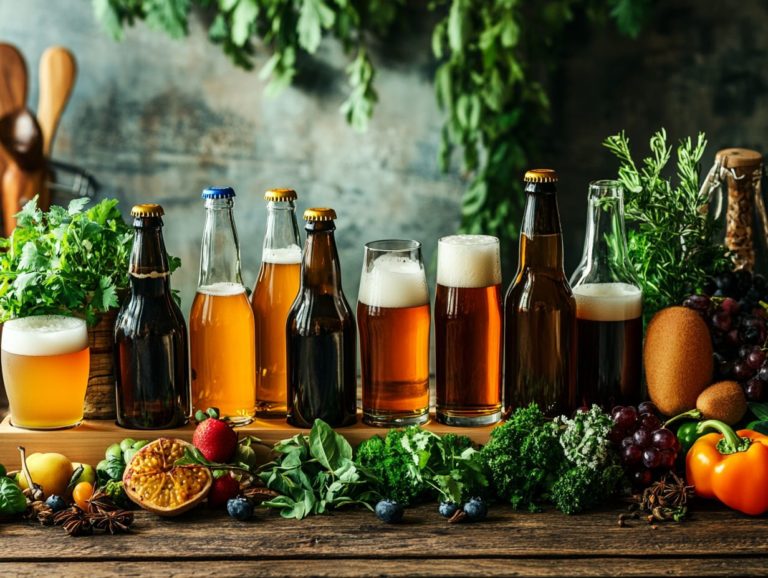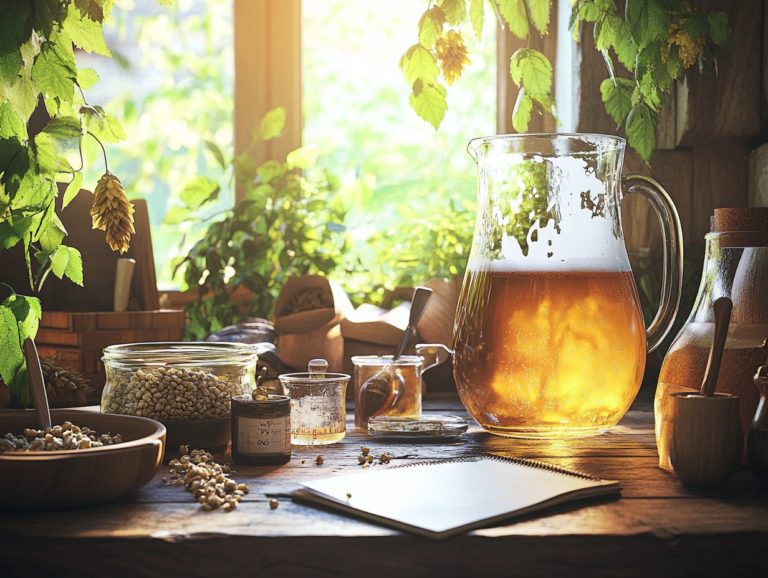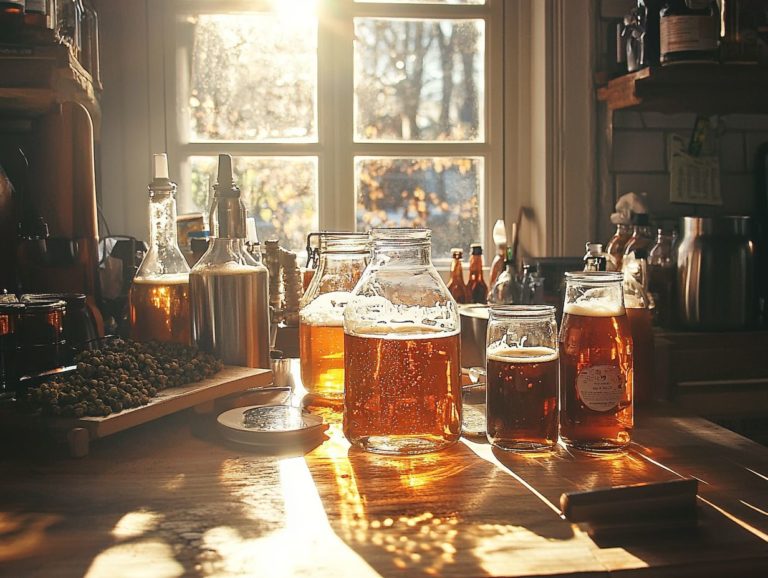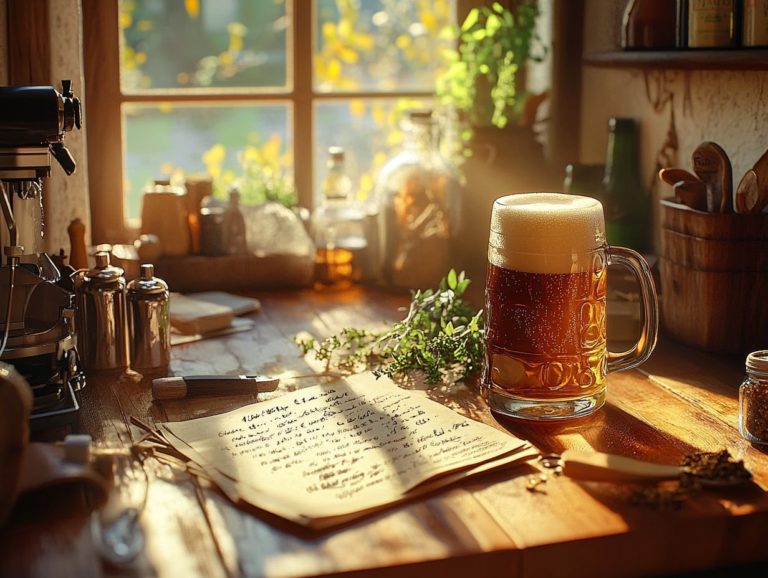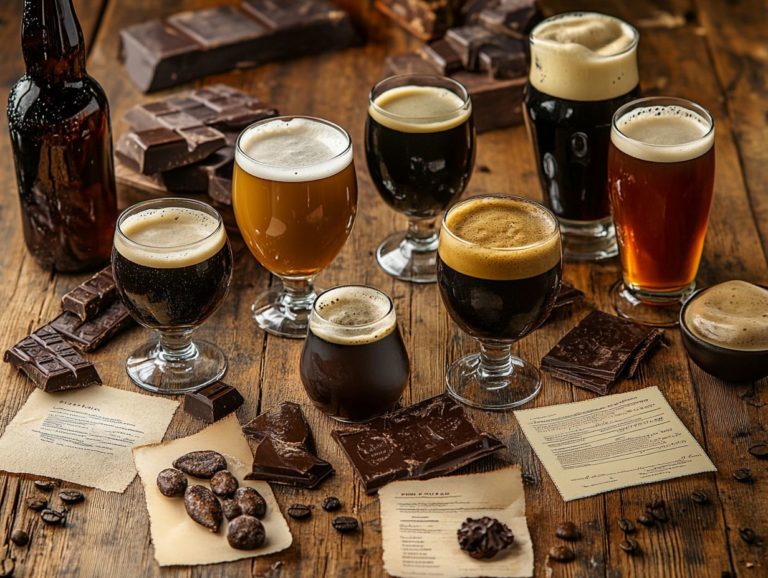How to Brew Beer with Spices and Herbs
Exploring the world of brewing beer unveils a treasure trove of possibilities, particularly when it comes to improving your creations with spices and herbs.
These flavorful additions go beyond mere hops, elevating your brews by offering unique aromas, improved nutritional benefits, and even medicinal properties. Brewing spices and herbs can bring a whole new dimension to your craft beer.
Whether you’re a seasoned brewer or just starting your journey, grasping which spices and herbs to incorporate, how to select them, and the steps to seamlessly integrate them into your recipes will undoubtedly enhance your brewing skills. Start learning about exciting ingredients today to elevate your brewing!
Dive in and discover exciting ways to infuse your beer with vibrant flavors and health benefits that will not only delight your palate but also impress your friends. Homebrewers will find that adding herbs and spices to their homebrew recipes can lead to extraordinary results.
Contents
- Key Takeaways:
- What Are the Benefits of Using Spices and Herbs in Brewing Beer?
- Common Spices and Herbs Used in Beer Brewing
- Spices for Brewing
- 5. Rosemary
- How to Choose the Right Spices and Herbs for Your Beer Recipe?
- 1. Consider the Style of Beer
- 2. Think About Complementary Flavors
- 3. Research Traditional Beer Recipes
- What Are the Steps to Brew Beer with Spices and Herbs?
- 1. Prepare the Spices and Herbs
- 2. Add Spices and Herbs During the Boiling Process
- 3. Add Spices and Herbs During the Fermentation Process
- 4. Bottle or Keg the Beer
- Frequently Asked Questions
Key Takeaways:

- Adding spices and herbs to brewing beer can enhance flavors and aromas, provide nutritional value, and offer medicinal benefits.
- Commonly used spices and herbs in brewing beer include hops, coriander, ginger, cinnamon, rosemary, and many herbs from the garden.
- When choosing spices and herbs for your beer recipe, consider the style of beer, complementary flavors, and traditional recipes.
What Are the Benefits of Using Spices and Herbs in Brewing Beer?
Incorporating spices and herbs into your brewing not only enhances the flavor profile but also enriches your overall experience by introducing unique flavors and aromas that can elevate your craft beer creations to new heights.
This creative approach, steeped in ancient styles and brewing techniques, provides you with an opportunity to experiment with herbal infusions, leading to complex flavors and even nutritional benefits.
Certain spices and herbs may also have medicinal properties that add further depth to your brewing process, transforming it into not just a craft but an art form that beautifully marries tradition and innovation. Many ancient styles utilized spices for their benefits beyond flavor, highlighting the rich brewing history of using these elements.
1. Adds Unique Flavors and Aromas
Spices and herbs are vital in adding unique flavors and aromas to your brewing endeavors, transforming ordinary beers into extraordinary craft creations that truly captivate the palate with their complexity and depth.
These ingredients add unique flavors, improving your overall drinking experience. For instance, imagine how cardamom introduces a warm, spicy character that harmonizes beautifully with malty sweetness in a creamy stout. Similarly, allspice combines the flavors of cinnamon, nutmeg, and clove, enriching the rich, dark profiles of porters. Experimenting with spices like these can bring creativity in brewing to a new level.
Floral scents from chamomile or lavender can bring a refreshing brightness that cuts through the bitterness of hoppy ales, resulting in a well-rounded and balanced flavor profile. By thoughtfully incorporating these elements, you can craft beers that not only tantalize your taste buds but also tell a captivating story with every sip. Such subtle additions highlight the importance of spice selection and careful infusion during the fermentation process.
2. Enhances Nutritional Value
Incorporating spices and herbs into your beer brewing enriches the flavor profile and enhances the nutritional value of the final product. This practice delivers additional health benefits that traditional brewing ingredients may sometimes overlook.
Many brewers are now experimenting with various botanical ingredients. They recognize their potential to elevate more than just flavor. For instance, consider using chamomile; it can impart a delicate floral note to lighter ales while offering calming properties. This makes it a delightful match for summer saisons.
Ginger is known for its anti-inflammatory and digestive benefits and is often used in some spiced winter warmers. It creates a perfect balance with those rich, malty flavors. Ginger can be especially impactful in a ginger-infused Pale Ale recipe. Don t overlook rosemary its addition to certain IPAs brings a refreshing piney aroma and is celebrated for its antioxidants.
By thoughtfully incorporating these herbs and spices, you diversify your beer styles and make your beer more enjoyable, transforming a simple beverage into a rich tapestry of taste and health.
3. Provides Medicinal Properties
Many spices and herbs you incorporate into brewing beer elevate the flavor and boast medicinal properties. They offer health benefits that enhance your brewing experience in a holistic way.
From ancient times, brewers like you have recognized the value of these botanical ingredients, understanding their benefits extend far beyond taste enhancement. Take ginger, for example; it s not just celebrated for its aromatic qualities but also for its anti-inflammatory effects, making it a favored choice in craft brews.
Chamomile, renowned for its calming properties, might be infused into lighter ales to promote relaxation. Consider rosemary, with its impressive antioxidant-rich profile. It can add a unique twist to darker beers while providing potential health benefits.
Such herbal infusions aren’t a modern trend; historical records show that various cultures have utilized spices in brewing for centuries to enhance flavor and promote wellness. This ties into the broader context of brewing history where spices played a significant role.
Common Spices and Herbs Used in Beer Brewing
When you delve into the art of brewing beer, you’ll discover that certain spices and herbs have become essential tools in the arsenal of both homebrewers and craft brewers. These ingredients are celebrated for their remarkable ability to elevate flavor profiles and craft distinctive flavors that characterize a wide array of beer styles.
Homebrew tips often include recommendations for herbs for brewing and how to achieve the perfect balance of flavors and aromas.
1. Hops

Hops are among the most essential ingredients in brewing beer. They are celebrated for their ability to impart bitterness and a range of aromatic elements that significantly shape the overall flavor profile. The delicate oils in hops are crucial for achieving the desired bitterness and flavor.
These flowering plants do more than just add characteristic bitterness that balances the sweetness of malt. They provide an entire spectrum of flavors, from bright citrus and resinous pine to delicate floral and earthy notes. Your choice of hop variety is crucial in this equation.
If you aim for a vibrant, fruity profile perfect for pale ales, Cascade and Citra hops are your go-tos. Conversely, if you prefer a more subtle, herbal character, Saaz hops are ideal for traditional lagers. Testing spices along with hops can further refine the complexity and uniqueness of your brew.
When selecting hops, consider the specific style of beer you re brewing. Are you looking for a strong hoppy presence or a more balanced approach? Don t hesitate to experiment with different combinations. This creative exploration can lead to a unique brew that reflects your personal style and understanding of hop characteristics.
Are you ready to spice up your brewing adventures? Let s get started!
Spices for Brewing
2. Coriander
Coriander is a beloved spice in the world of brewing, offering a distinct flavor profile that ranges from citrusy to spicy. This versatility makes it an incredible ingredient for your beer recipes. Many homebrewing basics emphasize the importance of spice and herb selection to achieve desired flavor characteristics.
This unique spice works wonders when paired with other ingredients. It beautifully complements the malt and hops, elevating your overall drinking experience. Many brewers incorporate coriander into styles such as witbiers, where it adds a refreshing complexity alongside citrus peels. In Belgian ales, its earthy notes harmonize seamlessly with the fruity esters generated during fermentation.
If you’re venturing into the realm of homebrewing, timing is crucial when adding coriander. Try adding it later in the boil to keep its vibrant aroma intact or even during fermentation to preserve its aromatic qualities. Start with a small amount around 0.5 to 1 ounce per five gallons and adjust according to your taste. This approach will help you craft a well-balanced brew that showcases the spice without overshadowing other delightful flavors in your masterpiece.
3. Ginger
Ginger is a remarkable spice frequently used in brewing beer, renowned for its warm, aromatic flavor. It elevates the overall complexity and uniqueness of your brew.
This vibrant spice offers a zesty, slightly peppery taste that can transform various beer styles be it lagers, ales, or even stouts by adding an intriguing layer. As a homebrewer, you ll want to tap into ginger s bright notes to enhance the malt backbone, creating a refreshing balance. Imagine crafting a ginger-infused pale ale, where the spicy ginger dances harmoniously with the hoppy bitterness, or a ginger porter that introduces rich, earthy undertones.
To incorporate ginger effectively, consider using fresh ginger for bold flavor or dried ginger for a more subtle touch. Adjust the quantity based on the intensity you wish to achieve, ensuring that it accentuates the beer’s character without overwhelming its essence.
4. Cinnamon
Cinnamon is the warm, aromatic spice that can elevate your beer brewing game. It infuses your creations with a delightful sweet and spicy flavor that beautifully enhances seasonal brews and crafts unique flavor profiles.
Its versatility means this captivating spice can effortlessly complement a variety of beer styles from the rich depths of stouts and creamy porters to the lighter, more refreshing ales and festive winter brews. Whether you’re crafting a traditional holiday ale or daring to experiment with a spiced IPA, incorporating cinnamon can stir up comforting feelings and evoke that unmistakable seasonal cheer. It s a prime example of brewing spices that enhance the overall brewing experience.
As you explore the use of cinnamon, it s essential to consider the form you choose be it sticks, powder, or extracts since each brings a different intensity to the table. Adding cinnamon during the boil or fermentation process can profoundly shape the overall taste of your brew. Brewing with herbs and spices from your garden adds a personal touch to your creations.
However, remember that moderation is crucial; just a hint of this spice is all you need to achieve that perfect harmony between warmth and sweetness without overwhelming the other flavors. Consult brewer s tips and brewing advice for the best results.
Experiment with these exciting spices in your next brew and taste the difference!
5. Rosemary
Rosemary is not just an herb; it s a game-changer for your beer! This aromatic herb is becoming a sought-after ingredient in the world of brewing beer, celebrated for its piney and herbal flavors that add flavor and richness to different types of beer. It’s one of the many herbs you can consider when brewing with herbs and spices in beer.
This captivating ingredient has the potential to elevate everything from IPAs to stouts, offering a rich and refreshing flavor that delights the palate. Its unique flavor profile harmonizes beautifully with other botanical elements, making it an outstanding choice for craft brewers eager to push the boundaries of their creations. Whether you are brewing Belgian Witbiers or Scandinavian ales, rosemary can add a distinctive touch.
In terms of incorporating rosemary into your homebrew recipes, using fresh sprigs is key for achieving optimal aroma and flavor release. Many brewers recommend steeping the herb during the boil or adding it during fermentation to enhance the infusion.
However, it’s essential to exercise caution with the quantity, as rosemary can easily dominate other flavors if used excessively. Start with small amounts and gradually adjust to your taste preferences, ensuring a harmonious balance in your brews that will impress even the most discerning palates.
How to Choose the Right Spices and Herbs for Your Beer Recipe?
Selecting the right spices and herbs for your beer recipe is crucial in attaining the flavor profile you desire. This process demands thoughtful consideration of the beer style, the complementary flavors that enhance it, and the traditional brewing techniques that inform your choices.
Elevate your brewing to new heights and impress your friends!
1. Consider the Style of Beer
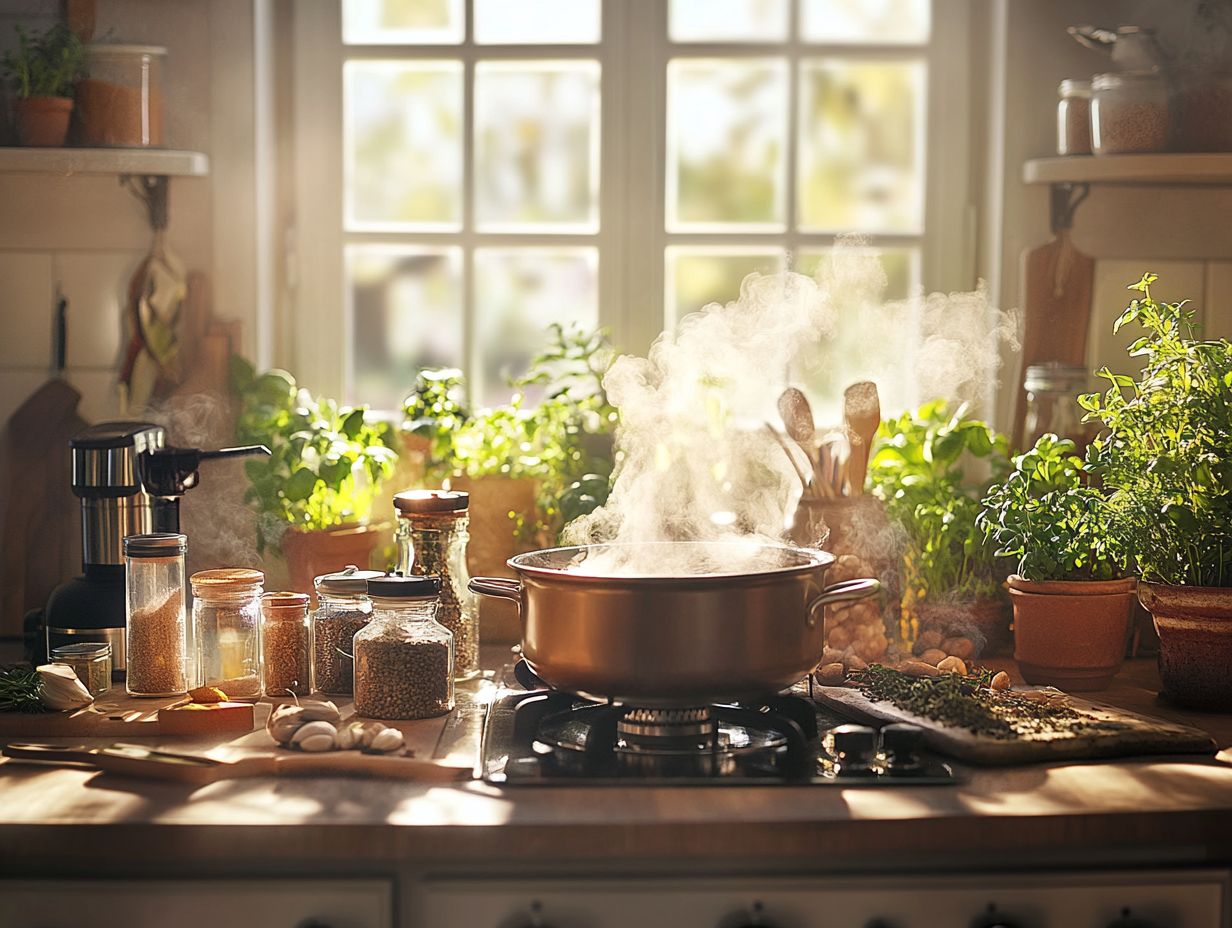
When you re selecting spices and herbs for your beer recipe, keep in mind the style of beer you re brewing. Different styles call for specific flavors that can truly enhance the overall taste experience.
Take, for instance, a traditional Belgian witbier. This brew often benefits from the addition of coriander and orange peel, which impart bright citrus notes and a subtle spiciness. These flavors perfectly complement the beer’s light and refreshing body.
On the flip side, when crafting a robust stout, consider adding vanilla beans or cinnamon. These ingredients can deepen the beer s profile, enhancing its rich, chocolatey undertones while introducing layers of complexity.
Herbs like rosemary and thyme elevate pale ales, introducing earthy notes that harmonize wonderfully with hoppy flavors. By pairing spices and herbs with the right beer style, you create unique flavors that resonate with both enthusiasts and novices alike. Consider adding herbs like basil or spices like allspice for creative brewing adventures.
2. Think About Complementary Flavors
When selecting spices and herbs for your beer recipe, considering complementary flavors is essential. The right combinations can elevate the overall flavor profile and create a more balanced brew.
This thoughtful process enhances your drinking experience and enables you to craft unique and memorable beers that truly stand out in a crowded market. To successfully identify these harmonious pairings, experiment and taste frequently.
For instance, pairing coriander with orange peel can yield a refreshing twist that s perfect for a Belgian witbier, while the warmth of cinnamon can beautifully complement a rich stout. The right spices can transform your beer into a work of art.
Understanding how these ingredients interact can transform your brewing endeavor into an artful expression of flavor. For example, spiced beers like Scottish Gruit or Sahti showcase how traditional spices and herbs can create distinct beer characteristics.
3. Research Traditional Beer Recipes
Researching traditional beer recipes can offer you invaluable insights when it comes to selecting spices and herbs. These time-honored techniques showcase flavor combinations that have truly stood the test of time.
For instance, Scandinavian ales often use juniper for a unique twist. Take, for instance, historical styles like Belgian Witbiers, which beautifully utilize coriander and orange peel to create a refreshing and aromatic profile. Classic English ales, on the other hand, might incorporate earthy, floral hops such as Fuggle or East Kent Goldings.
These traditional ingredients not only elevate the flavor but also reflect the agricultural practices and cultural preferences of their regions. In today s brewing scene, revisiting these age-old recipes allows you to boldly experiment with rare herbs or spices, pushing the boundaries of taste.
By honoring the past while embracing innovation, you can craft unique brews that resonate with both the legacy of brewing and the discerning palates of modern drinkers. Breweries like St. Feuillien in Belgium or Oskar Blues Brew School have paved the way for such inventive craft beers.
What Are the Steps to Brew Beer with Spices and Herbs?
Brewing beer with spices and herbs requires a series of careful steps that guarantee their flavors are seamlessly woven into the final product. From the initial preparation to the fermentation process and finally to the bottling or kegging stages, each phase plays a crucial role in achieving a harmonious blend of aromas and tastes.
Following brewing advice from experts like David Ackley or institutions like the Siebel Institute of Technology can ensure success.
1. Prepare the Spices and Herbs
Preparing the spices and herbs is a crucial step in brewing beer. This process involves methods such as crushing and simmering spices or creating herbal infusions that unlock their unique flavors before they make their way into the brew.
Using a yeast starter, which is a small batch of yeast that helps in fermentation, can also help in better infusion of flavors during fermentation. These techniques elevate the aromatic profile and significantly influence the overall taste experience of your final product.
For example, when you crush herbs and spices, you release essential oils and compounds that maximize flavor potency. Simmering, on the other hand, allows for a gentle extraction process, melding the ingredients gradually into the mixture.
Alternatively, steeping herbs in hot water before adding them to the brew creates a concentrated extract, ensuring that the desired flavors stand out in the finished beer. Each method contributes a distinct character to your brew, highlighting the importance of selecting the right technique to achieve your desired outcome.
2. Add Spices and Herbs During the Boiling Process
Adding spices and herbs during the boiling process is a crucial step in brewing beer, as this technique allows you to extract essential oils and flavors that enhance the beer’s overall profile.
The timing of when you introduce these ingredients can significantly influence the taste, aroma, and complexity of your final product. For example, when you add hops early in the boil typically within the first 60 minutes you release bitterness that perfectly balances the sweetness of the malt.
On the other hand, if you incorporate delicate herbs or spices like coriander or orange peel closer to the end of the boil, perhaps in the last 5-10 minutes, you preserve their aromatic properties, ensuring that those nuanced flavors don t vanish into thin air during the longer cooking time. Such meticulous attention to timing can create layers of flavor, transforming a standard brew into something truly extraordinary.
3. Add Spices and Herbs During the Fermentation Process
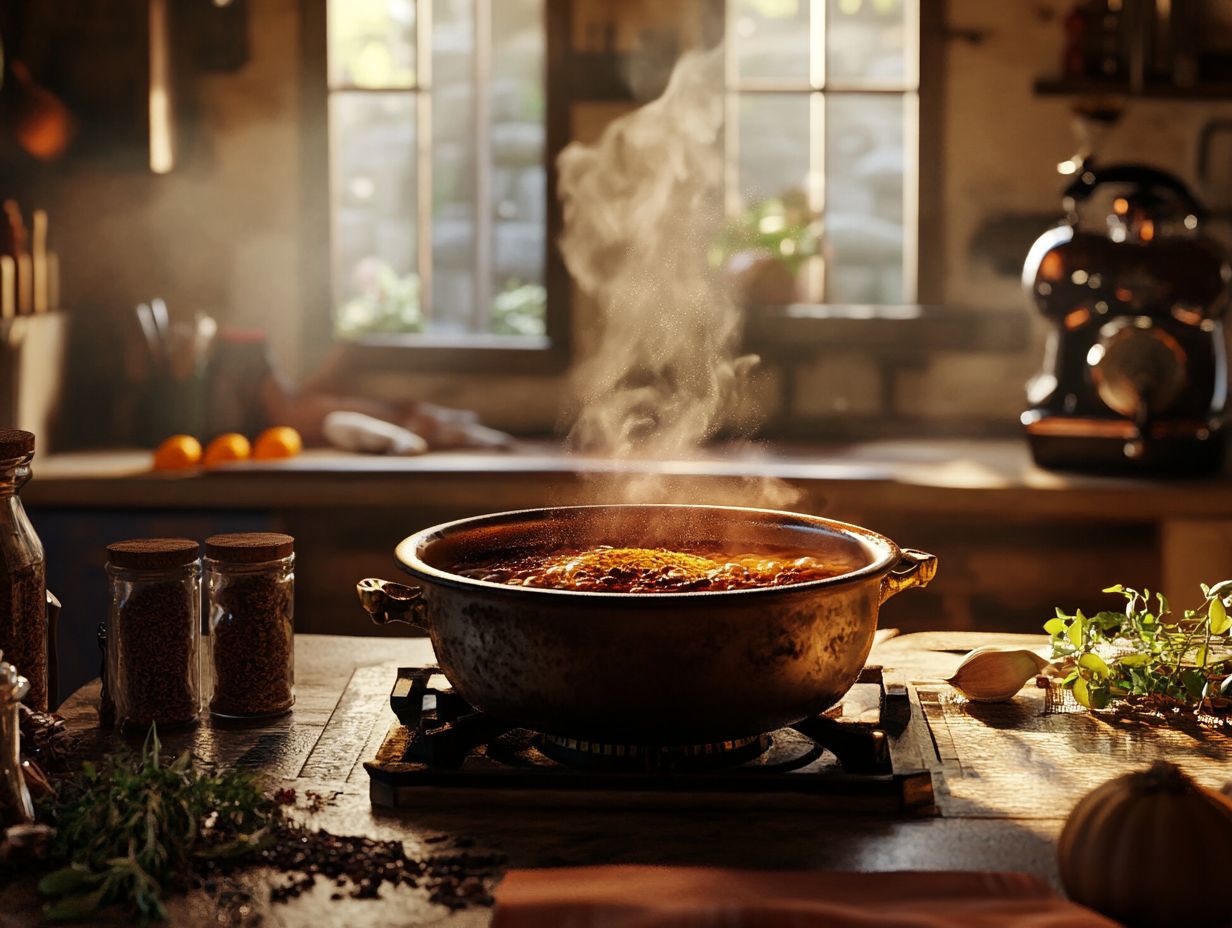
Incorporating spices and herbs during the fermentation process can significantly elevate the flavor infusion, allowing you to cultivate a more nuanced flavor profile that deepens as your beer matures. This is particularly effective in secondary fermentation, where longer contact time allows for a deeper infusion of flavors.
By introducing these delightful elements, you have the opportunity to craft unique layers of taste that evolve over time, resulting in a drinking experience that is both complex and rich. For instance, adding spices like cinnamon or coriander can give your brew warm, aromatic qualities, while herbs such as rosemary or basil bring fresh, earthy notes to the forefront.
Timing is crucial when it comes to adding these ingredients. Introducing them early can yield a subtler presence, whereas incorporating them closer to the end of fermentation can result in a more pronounced flavor.
As a general guideline, consider using about 0.5 to 2 ounces per 5-gallon batch, adjusting according to the potency of the spices or herbs and the intensity of flavor you wish to achieve. This easy brewing tip can help you achieve the perfect balance!
4. Bottle or Keg the Beer
After you ve brewed your beer with those delightful spices and herbs, the final step is to bottle or keg it with care, ensuring that the unique flavors and aromas developed during brewing are preserved for your enjoyment. Breweries like St. Feuillien and experts like Alexis Briol offer invaluable tips for this crucial step.
This process is crucial for maintaining the beer’s character. When you transfer the brew, it s essential to reduce oxygen exposure, as this can dull the taste and lead to oxidation. Using a siphon or a counter-pressure filling system can significantly reduce this risk.
In terms of selecting bottles or kegs, choose dark glass or stainless steel to protect your beer from light, which can introduce off-flavors. Using ingredients like Golden Light Extract, Two Row Malt, Munich Malt, Caramel Malt, and Irish Moss can also enhance the stability and flavor of your brew.
Once you’ve bottled your brew, make sure to cap them properly to avoid leaks, and store the beer upright in a cool, dark place to maintain its freshness. Pay attention to these details to enhance your drinking experience and extend your beer’s shelf life. For optimal results, consider using additives like Irish Moss during brewing to improve clarity and stability.
Frequently Asked Questions
What are the best spices and herbs to use when brewing beer?
Some popular spices and herbs to use in brewing beer include coriander, ginger, cinnamon, clove, and cardamom. Other options include juniper, allspice, and herbs from the garden like fresh basil. Ultimately, the best combination depends on personal preference and the desired flavor profile of the beer.
How should I add spices and herbs to my beer during the brewing process?
The best way to add spices and herbs to your beer is during the boiling stage. This allows the flavors to infuse with the wort and create a more balanced taste. This spice infusion can greatly enhance the aroma and flavor of your beer. You can also add herbs during the fermentation stage, but the flavors may be more subtle. Avoid adding them directly to the bottle or keg, as they may not fully dissolve and can create an uneven flavor.
Can I use fresh herbs and spices from my garden in my beer?
Yes, you can use fresh herbs and spices from your garden in your beer. Just make sure to thoroughly clean and sanitize them before adding them to your brew. This will help prevent any unwanted bacteria from contaminating your beer. Cooking with herbs can also inspire new and exciting flavor profiles in your homebrew.
How much spices and herbs should I use in my beer?
This depends on personal preference and the type of beer you are brewing. As a general rule, start with small amounts and gradually increase to find the perfect balance of flavors. Monitoring spice quantities is crucial as it’s always easier to add more, but difficult to remove too much.
Experiment with spices and herbs in your next brew for an exciting flavor adventure!
Can I use ground spices instead of whole spices in my beer?
Yes, you can use ground spices instead of whole spices. Ground spices add flavors more quickly, so adjust the amounts accordingly.
Wrap them in cheesecloth or use a mesh bag to keep sediment out of your beer. For example, adding ground allspice can enhance the beer’s aroma and complexity!
How long should I let my beer sit before consuming it?
The time you should let your beer sit depends on the type you are brewing and the flavors you want. Generally, let it sit for at least 2-3 weeks to allow the flavors to fully develop.
Stronger beers like Belgian ales may benefit from longer aging periods. To get the best results, follow the specific instructions for your recipe or ask a brewmaster for advice!

